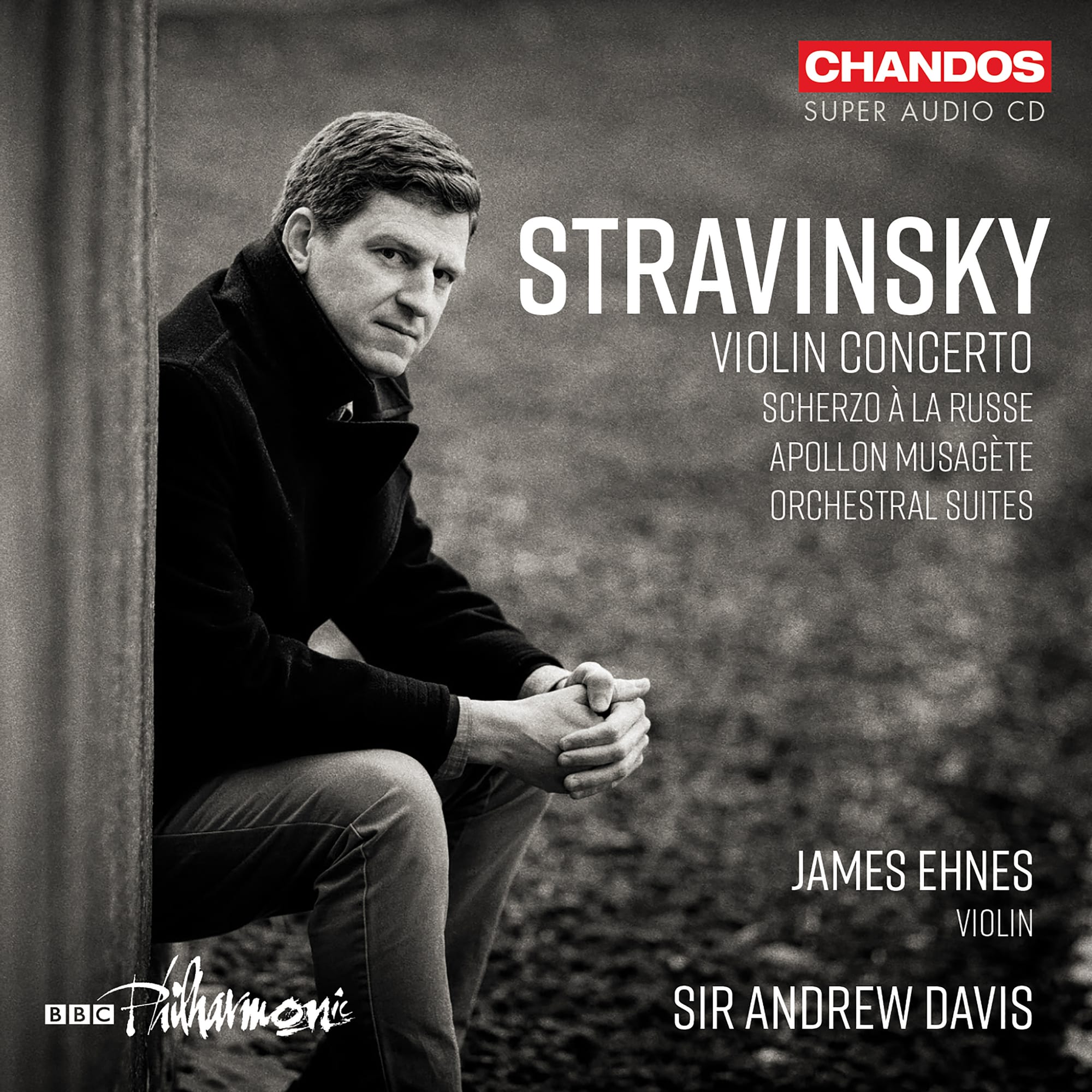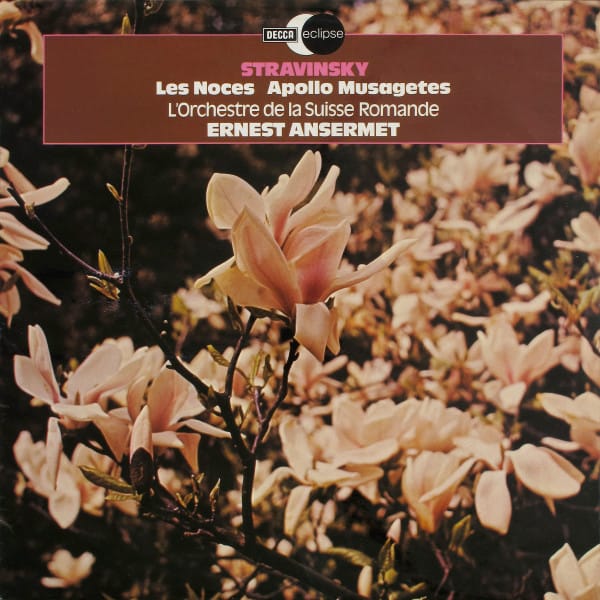Stravinsky: James Ehnes in the Violin Concerto, plus much more
This Chandos Stravinsky disc is a corker

What a fabulous programme; what fabulous performances!
Stravinsky wrote one of the great violin concertos, and here it is, in one of the great performances. There are more versions in the catalogue of the piece than one might think (I did a "Back of Gramophone" overview once, and the bag of CDs was heavy indeed!) but Ehnes pretty much goes to the top of the pile.
I last caught Ehnes live in Montréal, Canada with that city's orchestra under Rafael Payaré in 2022 in the Korngold Violin Concerto; but we have covered his recordings here on Classical Explorer also, in Beethoven Violin Sonatas with Andrew Armstrong here.
Written for the Polish virtuoso Samuel Dushkin, who premiered it with the composer conducting, Stravinsky's four-movement Violin Concerto reflects Stravinsky's admiration for the music of Bach as its inspiration. It is built around a chord of the notes D, E, and A, which Stravinsky described as his ‘passport to the concerto’ and with which the solo violin part opens each movement; as such it becomes a structural articulator. This is the chord which the dedicatee, Polish-born Samuel Dushkin, said was impossible on first glance but later, when he tried it, had to recant.
The performance is superb in its grasp of Stravinsky's world; the rhythms of the first movement have real life but never quite move towards "Cricus Music". Buoyancy is all, and Sir Andrew Davis ensures the BBC Philharmonic react with split-second accuracy:
Ehnes and Davis make perfect sense of the second movement: listen to how the music comes into focus with the violin's descending scale around 30 seconds in; and how later Ehnes finds a sweet lyricism in Stravinsky's often disjunct lines. The recording incidentally captures the warm sound often BBC Philharmonic to perfection:
... that was the first of two “Arias”. The second is graceful and lyrical; and heartfelt, here. The second digs deeper. Listen to how the linear decorations of the melodic line reference Bach and Baroque music, but the harmonic “tang” is pure Stravinsky, and when the music relaxes towards the end, the BBC Philharmonic's woodwind is blissfully lovely:
The finale is marked “Capriccioso” and begins in a frenzy before the violin digs in on its G-string. The velocity is perfectly judged, and the lightness of the spiralling gestures at 4"31 is better than any of the many performances I have heard of this piece:
I for one am happy for this to share shelf space with another fine performance considered by Classical Explorer, Isabelle Faust with Les Sièces and François-Xavier Roth. Another violinist who offers a fine account (coupled this time with the Beethoven Violin concerto) is Vilde Frang.
The Scherzo à la russe doesn't get out as much as it should - I don't think I have ever heard this piece live. Composed for the Paul Whitman band (while the composer was in California), it is masterful and utterly of its composer, and the BBC Philharmonic clearly has a riot:
The two Suites for Small Orchestra are made up of arrangements of pieces originally for four hands. They are as masterly as one night think, and Davis and the Mancunians capture their concise, individual world perfectly, Laudably, Davis resists any temptation to buffer the objectivity of Stravinsky's piano originals just because they are now on an orchestral palette, and this works perfectly. Here's the second piece of the first suite, a “Napolitana”:
The pieces are brilliant, and brilliantly pithy, each one a distillaion of Stravinsian traits, as well as deconstruction of what makes up Russian folk music. Davis' tempos seem perfect for each, not least in t final “Balalaika” from Suite No. 1, just restrained enough to make every note count (the temptation is to take it faster, but this works better!):
The bitonality (two tonalities performed together) is perfect in the first movement of the Suite No. 2, the clashes glorious:
while the happy-go-lucky yet harmonically pungent finale is the perfect close. The BBC players revel in the composer's sudden juxtapositions:
The final work, Apollon musagète, could hardly be more different. Written in 1927/8, this piece's reference point is the ballet de cour of the French court. Listen to this first track, the “Naissance d'Apollon” (Birth of Apollo) complete to hear the superb sense of grace here:
Davis seems to understand not only Stravinsky's use of gesture completely, but also how the whole hangs together - quite the tightrope act. The sheer grace of “Apollon et les trois Muses (Pas d'action)” is superb:
Each of the three music (Calliope, Polymnie and Terpsichore) gets a variation each, before that of Apollo himself. This last seems particularly beautiful, itself preaching a Pas de deus between Apollo and Terpsichore that is simply stunning in its withheld grace:
The sheer contented beauty fo the close of that “Pas de deux” is a miracle in itself in this performance. The ensuing “Coda” and “Apothéose” are the perfect close. Listen to the intensity of the high sting chords at the opening of the final “Apothéose”:
My previous reference point for Apollon was Ernest Ansermet (a conductor much associated with Stravinsky) and L'Orchestra de la Suisse Romande on Decca, a 1955 recording you can find below; now Davis shares pride of place. Incidentally, I first got to know the Ansermet via a classic Decca Eclipse LP, ECS 822 and I reproduce the cover below in a fit of nostalgia:

.. and overall, I also find Davis' phrasing and textural leanness more appealing than the rather more upholstered version by Riccardo Chailly and the Royal Concertgebouw Orchestra on Decca (now part of the Chailly Decca Edition);
The Chandos Stravinsky disc is a corker though - if this is your introduction to the world of this wonderful composer, how lucky you are!
Issued on Hybrid SACD in terrific sound, this disc is available at Amazon here; the Chailly box (not cheap) is here, Chandos Spotify below:
